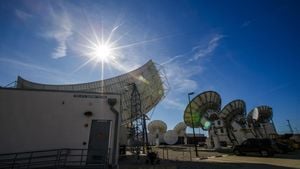Rivian has ignited quite the buzz within the automotive industry, not just as another electric vehicle maker but as a serious contender potentially reshaping automotive leadership. The company’s ambitious approach, particularly its recent partnership with Volkswagen, has garnered attention both for its promise and challenges. Investors and industry watchers are keeping close tabs, welcoming the prospect of Rivian's innovative technology impacting traditional automakers impacted by stiff competition.
Founded by RJ Scaringe, Rivian burst onto the scene with its all-electric R1T pickup truck and R1S SUV, quickly proving itself more than just the new kid on the block. The company has positioned itself uniquely by catering not only to eco-conscious consumers but also adventure enthusiasts. With rugged designs and off-road capabilities, Rivian has set itself apart from incumbents like Tesla, aiming for markets traditionally dominated by gas-guzzling trucks.
Just recently, Volkswagen announced it would be investing significantly—up to $5.8 billion—into Rivian to form a joint venture aimed at integrating Rivian’s advanced technologies for electric vehicles across various segments. The financial commitment demonstrates VW’s serious intent to not only share technology but to learn from Rivian's agile model. It’s seen as strategic because, quite frankly, the traditional automotive business model is struggling amid the rapid transition to electric vehicles (EVs).
Scaringe acknowledges the challenges but remains optimistic, noting how the partnership powers up Rivian’s negotiating leverage with suppliers. Previously, as he recounted during a recent roundtable, Rivian faced skepticism from suppliers who would refrain from treating the relatively new company as equals. Now, with VW backing, those dynamics are shifting sharply. "Suppliers are now coming to us," Scaringe shared, depicting the newfound clout the startup is gaining.
Though Rivian's partnership with VW has become a cornerstone of its strategy, not everything has gone smoothly. A recent controversy hit hard when Rivian miscommunicated demand forecasts to Essex, its key supplier for electric motor components, leading to the company facing significant production setbacks. It's reported Rivian lost around 10,000 vehicles due to this blunder—a miscalculation considered not only costly but emblematic of the challenges facing newer players eager to race against established giants.
This production hiccup points to the larger challenge of scaling operations. Rivian has singled out the importance of building strong relationships with multiple suppliers to avoid such pitfalls and whether through VW's extensive automotive network or forging new connections, the company is forming its path forward.
Meanwhile, Rivian’s importance is underscored as analysts note the automotive industry is on the verge of seeing even more players enter the EV space. Rivian stands at the forefront poised to compete not just against traditional manufacturers like Ford and General Motors but also with tech giants who might leapfrog traditional models to dominate the EV market.
Electric vehicle adoption is projected to accelerate, with studies indicating we could see 57% of vehicles on the road being electric within the next decade. Rivian must navigate this rapidly changing environment, where they will face increasing scrutiny from investors and customers alike who prioritize not just performance but reliability and safety. The shift provides both risk and opportunity. Scaringe's team understands the gravity of establishing Rivian as not just another electric vehicle brand, but as a leader capable of innovatively addressing buyer’s needs.
More broadly, the automotive sector must recognize the changing preferences of consumers, as surveys reveal many buyers still prioritize reliability and cost over the sex appeal of EV technology. This is where Rivian’s strategic focus on outdoor lifestyle and utility-driven patterns can resonate deeply, potentially capitalizing on the 80% of buyers who value these attributes.
But Rivian isn’t the sole innovator at play as several other companies vie for leadership status. For example, Lucid Motors is pushing its ultra-luxurious EVs seeking to attract high-end consumers, whereas brands like Ford are electrifying popular models like the F-150, aiming to marry tradition with innovation. Existing players are adapting to stay relevant, and Rivian's unique positioning as both rugged and tech-savvy means it could chart its distinctive course amid this stomping ground.
All the excitement and challenges around Rivian provide rich fodder for speculation about the automotive future. If successful, Rivian could not only transform itself but could also spark even more extensive changes across the industry, prompting traditionalists to rethink their strategies as tech-driven giants come to the fore. With Rivian continuing onward and upward, it may just be the fresh perspective the automotive world needs.
Analysts note, though, the clock is ticking. The shift to electric mobility isn’t merely about producing vehicles; it’s about creating brand trust and holistic ecosystems around them. Factors like customer service, software updates, and charging infrastructure will be decisive. Rivian’s ability to innovate on these fronts—while avoiding costly blunders—will significantly shape not only its future but could also redefine leadership dynamics across the auto industry.
All this makes Rivian the focal point of many conversations as industry experts unpack the paradigm shifts impacting automotive leadership. With the backing of major partnerships and learning from past mistakes, the future looks promising for Rivian—but only if it can successfully navigate the ever-evolving terrain of electric mobility. Rivian must continue to drive forward, balancing ambition with sustainability and adaptability to market needs.



